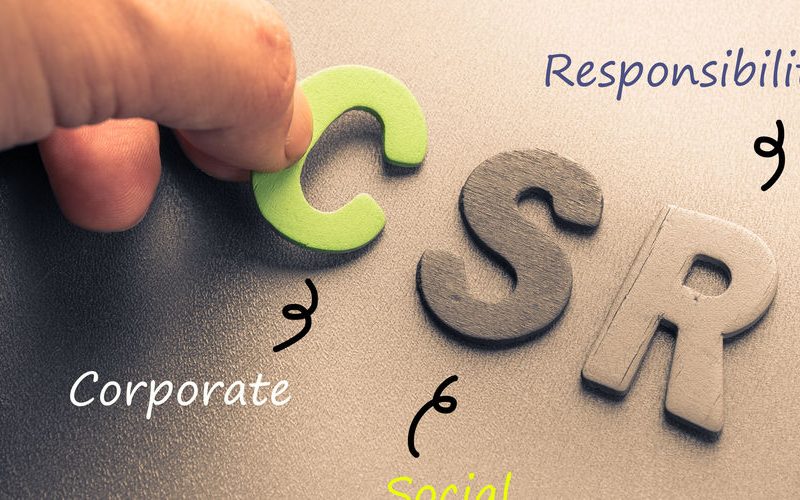Businesses exist not only for profit maximization but also to have a positive impact on the society in which they operate. As a result, Corporate Social Responsibility (CSR) is an obligation that any business should assume the moment it begins operations in a specific location. I hope that didn’t frighten you. Well, if you’re considering starting a business, large or small, you must understand the social responsibility that your company owes to society.
In this regard, we took the time in this article to explain what CSR job reporting means, as well as how to obtain certification for your business. So, join us as we get started.
Understanding What CSR Means
CSR is a self-regulating business model that assists a company in being socially accountable—to itself, its stakeholders, and the general public. Companies that practice CSR can be aware of the impact they have on all aspects of society, including the economic, social, and environmental.
CSR means that the business operates in ways that benefit society and the environment rather than harming them in the ordinary course of business. As important as CSR is for society, it’s equally beneficial to businesses. CSR activities can help employees and corporations form stronger bonds, boost morale, and make both employees and employers feel more connected to the world around them.
To be socially responsible, a business must first be accountable to itself and its shareholders. Companies that implement CSR programs frequently have grown their businesses to the point where they can give back to society. As a result, CSR is typically a strategy implemented by large corporations. After all, the more visible and successful a corporation is, the greater its responsibility to set ethical standards for its peers, competition, and industry.
What Is CSR?
The term corporate social responsibility refers to corporate practices and policies that are intended to have a positive impact on the world.
Furthermore, the central idea behind CSR is that corporations should pursue other pro-social goals in addition to profit maximization. Common CSR job objectives include donating to charity, reducing environmental externalities, and encouraging employee volunteerism.
Why Should a Business Implement CSR?
Companies that engage in positive social responsibility programs not only receive favourable press. They also attract top talent, achieve higher customer satisfaction, and have an impact on the communities in which they operate.
This supports the idea that a company implementing these practices will benefit financially and economically as it shows benefits ranging from employee retention to sales growth.
Additionally, businesses see CSR as an essential component of their brand image. They believe that customers will be more likely to do business with brands they perceive to be more ethical. CSR activities, in this way, can be an important aspect of business public relations. At the same time, some company founders are motivated to participate in CSR because of personal convictions.
Many businesses, for example, have taken steps to improve the environmental sustainability of their operations, such as installing renewable energy sources or purchasing carbon offsets. Efforts have also been made to eliminate reliance on unethical labour practices, such as child labour and slavery, in supply chain management.
Although CSR programs have traditionally been associated with large corporations, small businesses can also participate through smaller-scale initiatives such as donating to local charities and sponsoring local events.
Corporate Responsibility Types
Although fundamentally good, CSR is a broad phrase that takes on diverse meanings for different firms; yet, it’s generally grouped into the following categories:
#1. Economic Responsibility
What responsibilities does the company assume to ensure that it makes sound, long-term economic decisions?
To be competitive, every firm must prioritize its bottom line. Economic longevity while keeping all other corporate social responsibilities will most certainly be difficult. However, organizations with a complete CSR program will ensure that they accomplish economic development without losing any sorts of CSRs.
#2. Business Ethics
What steps is the business taking to guarantee that their operations, products, and partners all adhere to business ethics?
Ethical decisions must be taken regardless of the size of a business or institution. Most company ethics decisions have to do with fair labour and hiring standards. Furthermore, it extends to the ethics of the products they are acquiring for their business. A T-shirt firm, for example, that purchases fair trade certified materials have clearly stated that procuring ethical products is high on their values list
#3. Environmental Sustainability
What CSR steps is the business taking to guarantee that its job operations are environmentally sustainable?
An organization’s initiatives in this area may involve adopting operational efforts to reduce greenhouse gas emissions. A beverage firm, for example, may choose to use aluminium cans rather than plastic because you can easily recycle aluminium, plus they’re less likely to end up in a landfill. This is an example of a company’s standards for the creation of its product.
#4. Philanthropic Activities
What is the business doing to encourage philanthropic initiatives in their areas or for organizations that they support?
Spending money, time, or resources on a local, national, or international cause demonstrates that an organization has positive philanthropic efforts. Whether or not the cause ties directly to the business, this is an excellent approach for organizations to increase morale while boosting patriotic employees and partners.
Example of Some Corporations That Engage in CSR
- Coca-Cola Enterprises
This is the number one brand with CSR certification. Coca-Cola launched the 5by20 initiative, a program aimed at empowering women around the world. Initiatives of larger organizations, such as this one, might serve as a model for newer or younger businesses.
- Starbucks is number one.
Starbucks is another business with certification that engages in CSR practices in its job operations. It’s popular for its strong sense of dedication to giving back to the communities from which it sources its coffee.
- Tesla Motors, Inc.
Elon Musk, CEO of Tesla, has incorporated corporate social responsibility into the design of his product. Idea through innovations in electric vehicles and other forms of technology that support sustainability.
CSR Reporting and Certification
Certification in CSR is suitable for:
Business owners with the interest in expanding their knowledge and careers in business sustainability, environmental stewardship, social responsibility, and values-based innovation.
A CSR reporting is a process by which a business publishes a written document at regular intervals where it highlights its efforts showing:
- Commitment to social and environmental causes
- How its strategy and business model are linked to this commitment
- Reports on initiatives and actions undertaken or planned to undertake in the coming years to further this commitment.
- Lastly, reports on the social and environmental impact of these actions
Benefits Of CSR Reporting
CSR reporting has a number of benefits:
- It serves as a planning and control tool for operations, assisting corporate management in setting and prioritizing objectives, as well as tracking progress toward those objectives.
- CSR reporting is a method of publicizing a company’s participation to internal and external stakeholders.
- Also, CSR reporting has a significant impact on a firm’s ratings since rating organizations use visible data to measure and rate a firm’s performance.
What Makes a Standard CSR Reporting?
Indeed companies have a lot of flexibility in selecting the format and content of their report. Nonetheless, there are generally acknowledged quality standards that rating firms routinely use to analyze CSR reporting.
Among these requirements are the following:
#1. Balance criterion
This requires a business reporting its CSR to openly reveal encountered obstacles on the job and “non-achievements” in addition to emphasizing positive parts of their activities.
#2. Comprehensiveness criterion
The job of the business reporting its CSR must involve addressing both environmental and social concerns. These include the observance of basic human and labour rights, the prevention of corruption, and consumer protection.
Certification to ISO 45001 confirms that your business has created an OH&S management system that is compliant with the CSR. Also, the certification assists enterprises in achieving safe and healthy workplaces, preventing injury and sickness, and improving OH&S performance.
#3. Materiality criterion
This means that the business should prioritize matters over which it has influence and which are also of substantial importance to its stakeholders.
#4. Accountability criterion
For CSR reporting to be standard, the business should define quantifiable CSR goals for itself and track progress against those goals on a consistent basis. SA8000 certification validates a company’s commitment to socially responsible workplace practices. It’s awarded to companies that meet high social accountability standards and is based on a management system approach. Bureau Veritas provides SA8000 certification to assist your business in demonstrating the highest level of CSR compliance in your supply chain.
What is the main purpose of CSR?
Giving back to the community, supporting charitable organizations, and adding value to society are all goals of corporate social responsibility. To make a difference and create a great brand for their firm, businesses are turning more and more to CSR.
What are the limitations of CSR?
The impact on public perception is one of the biggest drawbacks of CSR in business. Once you become well-known, everything you do is more likely to come under close scrutiny. You may face criticism for even the slightest activities as an institution that upholds its credibility by its actions.
What is a CSR policy?
Human rights, as well as the social, economic, and environmental implications of what businesses do, are all factors that are taken into account by CSR policies, which are meant to ensure that businesses operate ethically. The Considerate Constructors Scheme has created an example template for a CSR policy for sites without their own corporate policy in place.
What is the biggest impact of CSR?
Why Is Corporate Social Responsibility Beneficial? Adopting CSR enhances bottom-line financial results by improving employee engagement, brand image, investment opportunities, and talent attraction. It also boosts consumer retention and loyalty.
Why do companies fail in CSR?
The main factor is that the majority of CSR initiatives are essentially unquantifiable. Because businesses lack the resources to assess their social impact, they are unable to develop effective programs. In situations where CSR efforts fail or worsen the situation, it also lessens accountability.
Conclusion
Businesses should not only recognize but as well fulfil their duties to their environment and society at large. The concept of corporate responsibility implies that there are operational standards to which a corporation holds itself, its shareholders, and its employees.
Related Articles
- Project Management Reporting: Examples, Software & Tools
- CSR (Corporate Social Responsibility): Definition, Types & Examples
- DATA STRATEGY: 7 Component of Data Strategy every Compound needs
- SOCIAL MARKETING: The Basic Guide With Practical Examples
- List Of Federal Government Agriculture Grants
FAQ’s On What Is CSR
What is CSR in Simple Words?
CSR is a company’s commitment to responsibly manage the social, environmental, and economic aspects of its operations in accordance with public expectations.
What is CSR With Examples?
CSR is the process by which businesses consider how they might better serve society as a whole, ultimately improving their public image and relationships. Google, for example, invested $1.5 billion on renewable energy, and Disney invested $100 million in children’s hospitals.
What is CSR and its Benefits?
Positive business reputation. increased sales and customer loyalty. operational costs savings. better financial performance. greater ability to attract talent and retain staff.
Is CSR Good or Bad?
Implementing a CSR strategy benefits more than just the environment and society; it also improves a company’s reputation. Employee morale is also boosted by CSR initiatives, as both employees and employers receive a better feeling of purpose in their job.
Can CSR Increase Profit?
According to studies, businesses that completely integrate CSR into their operations should expect good financial returns on their efforts. Companies that use CSR promote values, which eventually enhances customer traffic and consequently company profits.






